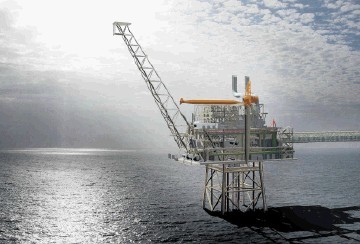
Global investors are targeting the North Sea oil industry and creating a new jobs boom.
Soaring interest in the sector is a massive turnaround from the dark days when Chancellor George Osborne was blamed for almost killing off investment in one fell swoop.
Leading energy firms were told yesterday that thanks to new Treasury measures, oil and gas reserves in UK waters are now being viewed more as a long-term asset than a short-term cash flow for the Exchequer.
The turnaround was hailed last night as great news for the north and north-east economy.
But there were also pleas for operators to be given the “stability” they need to plan ahead and maximise opportunities to pump money into new projects.
Mike Tholen, economics director at Oil & Gas UK, said a string of recent changes to the tax regime had meant global investors saw the offshore sector in a whole new light.
UK Government measures to promote investment in new fields and in existing fields – brownfields – were leading to the “green light” for projects which would boost staffing levels in supply companies and increase production and tax revenues.
The new incentives, which also include tax allowances for small fields, large deepwater fields and shallow-water gas fields, followed the damaging £10billion tax grab on UK oil and gas producers announced in the 2011 Budget.
This involved a supplementary tax on producers being increased from 20% to 32%, taking the top rate of tax for some fields to as high as 81%.
But Mr Tholen told industry figures at a business breakfast in London yesterday that since then there had been 18 months of “fiscal progress”.
He added: “Constructive engagement with HM Treasury since the 2011 Budget has resulted in the introduction of a range of tax measures, which have allowed global investors to consider projects on the UK continental shelf (UKCS) in a new light.
“Finally, the government has the levers to provide certainty and promote investment at all phases of a field development plan and, as such, can more directly help arrest production decline.”
He also said securing certainty on a tax relief for decommissioning costs would be a further boost.
“This will allow the UKCS to be managed as a long-term asset, not simply a source of short-term cash flow,” he said.
Talisman Energy announced recently that an incentive for brownfield projects had helped pave the way for its £1.6billion Montrose area redevelopment project. This will involve a new platform being built and a bridge linking the existing central North Sea Montrose platform to unlock two new fields – Cayley and Shaw – and 40million barrels of oil.
The project is expected to create or support over 2,000 UK jobs in the fabrication, construction, installation, subsea engineering and drilling sectors.
Two Chinese state-controlled oil firms have also announced plans to move into British waters through deals involving Canadian firms. Sinopec wants to pay £956million for 49% of Talisman’s North Sea business, while China National Offshore Oil Corporation has made a £9.6billion bid for Nexen, which operates the Buzzard development in the North Sea.
Recommended for you
